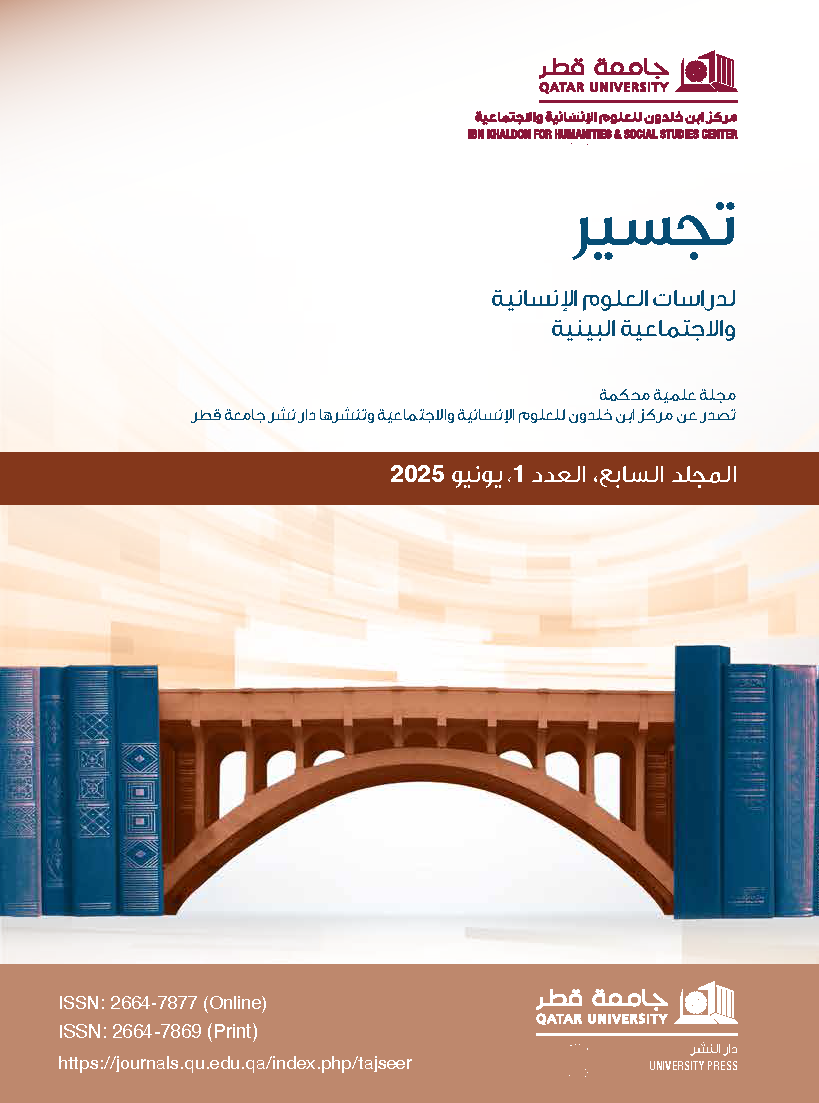الاقتصاد وعلم الاجتماع: بناء جسور من أجل سياسات عادلة وفعّالة
الملخص
يستعرض هذا البحث أهمية تجسير الفجوة بين الاقتصاد والعلوم الاجتماعية، في سعيه إلى فهم أعمق للظواهر الاقتصادية المعاصرة. نشأ علم الاقتصاد في القرن الثامن عشر كدراسة للقوانين التي تحكم النظام الرأسمالي؛ حيث كان يركز على الفردية المنهجية ويعتبر المصلحة الفردية محركًا أساسيًا للسلوك الاقتصادي، إلا أن هذا النهج تعرض للانتقادات بسبب فرضياته غير الواقعية حول العقلانية الفردية ووجود أسواق كاملة، مما أ غفل تأثير العوامل الاجتماعية وعدم اليقين. في ظل التحولات الاجتماعية والاقتصادية الكبرى، فبات من الضروري أن يتجاوز الاقتصاد نهجه التقليدي القائم على النماذج المجردة ويستفيد من رؤى علم الاجتماع لدراسة العوامل المؤسسية والثقافية المؤثرة في سلوك الأفراد والجماعات. يسهم هذا التعاون بين التخصصات في تطوير سياسات عامة تستجيب للتحديات المعاصرة وتعزز العدالة الاجتماعية، من خلال فهم شامل للعوامل الاجتماعية المؤثرة في القرارات الاقتصادية. يهدف البحث إلى تحقيق ثلاثة أهداف رئيسية: أولًا، استكشاف التأثير العميق للعلاقات الاجتماعية في تشكيل السياسات الاقتصادية ومعالجة الفجوات الاجتماعية الناجمة عن التركيز على النظريات التقليدية. ثانيًا، تحليل النظريات الاقتصادية الحالية وتقييم مدى قدرتها على استيعاب قضايا العدالة الاجتماعية، مع اقتراح نماذج جديدة تدمج مختلف الأبعاد الاجتماعية. ثالثًا، التأكيد على دور العدالة الاجتماعية كعنصر محوري في بناء سياسات اقتصادية تعزز التنمية المستدامة والشاملة، بما يضمن تكافؤ الفرص وتوزيع المنافع بشكل عادل. يوضح البحث أن ربط الاقتصاد بالعلوم الاجتماعية يسهم في خلق سياسات أكثر فاعلية وعدلًا، تعكس الواقع الاجتماعي وتستجيب لاحتياجات المجتمعات. مما يعزز تحقيق التنمية المستدامة استنادًا إلى قيم العدالة والمساواة.
المقاييس
##plugins.themes.bootstrap3.article.details##
علم الاقتصادعلم الاجتماعالعدالة الاجتماعيةالتجسيرالسياسات الاقتصادية
Beri, Suraj. New Economic Sociology, Indira Gandhi National Open University, 2021. https://egyankosh.ac.in/handle/123456789/76986
Bhatt, Gita. "Editor’s Letter: Economics That’s More Human,” Finance & Development, Vol. 61, No. 1 (March 2024), p. 5. https://doi.org/10.5089/9798400265013.022
Boadu, Comfort, Frederick Koomson, and Richard Oppong Ntiri. "Social and Solidarity Economy and Social Inclusion of Cooperatives in the Assin Fosu Municipality, Ghana." Heliyon 10, no. 5 (2024). https://doi.org/10.1016/j.heliyon.2024.e27094
Bögenhold, Dieter. “Economics between Insulation and Social-Scienciation: Observations by a Sociology of Economics,” Journal of Economic Issues, Vol. 52, No. 4 (2018), pp. 1125-1142. https://doi.org/10.1080/00213624.2018.1535954
Bögenhold, Dieter. “Social Network Analysis and the Sociology of Economics: Filling a Blind Spot with the Idea of Social Embeddedness,” American Journal of Economics and Sociology, Vol. 72, No. 2 (2013), pp. 293-318. https://doi.org/10.1111/ajes.12005
Bourdieu, Pierre. “The Forms of Capital,” In: J. Richardson (ed.), Handbook of Theory and Research for the Sociology of Education, New York: Greenwood, 1986, pp. 16-30.
Deaton, Angus. “Rethinking Economics: Questioning one’s views as circumstances evolve can be a good thing,” Finance & Development, Vol. 61, No. 1 (March 2024), pp. 20-21. https://doi.org/10.5089/9798400265013.022
Economic and Social Commission for Western Asia (ESCWA). Toolkit for mainstreaming social justice principles in development policies (in Arabic), Beirut, United Nations, 2020. E/ESCWA/CL2.GPID/2020/MANUAL.2
Hellerstein, Judith K. and Neumark, David. “Social Capital, Networks, and Economic Wellbeing,” Future of Children, Vol. 30, No. 1 (Spring 2020), pp. 127-152.
Kanbur, Ravi, Eduardo Ortiz-Juarez, and Andy Sumner. "Is the Era of Declining Global Income Inequality Over?" Structural Change and Economic Dynamics 70 (2024): 54. https://doi.org/10.1016/j.strueco.2024.01.002
Kanbur, Ravi., Ortiz-Juarez, Eduardo and Sumner, Andy. “Is the Era of Declining Global Income Inequality Over?” Structural Change and Economic Dynamics, Vol. 70 (2024), pp. 45-55. https://doi.org/10.1016/j.strueco.2024.01.002
Lang, Kevin and Majumdar, Sumon. “The Pricing of Job Characteristics When Markets Do Not Clear: Theory and Implications,” NBER Working Papers, No. 9911 (August 2003), pp. 1-33. https://doi.org/10.3386/w9911
Lopera-Arbeláez, Isabel, and Solveig Richter. "Transformative Approaches for Peace-Centred Sustainable Development: The Role of Social and Solidarity Economy." World Development Perspectives 34 (2024). https://doi.org/10.1016/j.wdp.2024.100593
Machado, N. M. “Karl Polanyi and the New Economic Sociology: Notes on the Concept of (Dis)embeddedness,” trans. João Paulo Moreira, RCCS Annual Review, Vol. 3, No. 3 (2011), pp.119-140. https://doi.org/10.4000/rccsar.309
Milanovic, Branko. Capitalism, Alone: The Future of the System That Rules the World. Cambridge: Belknap/Harvard University Press, 2019.
Ostrom, Elinor. “Beyond Markets and States: Polycentric Governance of Complex Economic Systems,” American Economic Review, Vol. 100, No. 3 (2010), pp. 641-672. https://doi.org/10.1257/aer.100.3.641
Raworth, Kate. “A New Compass for Economics,” Finance & Development, Vol. 61, No. 1 (March 2024), pp. 12-14. https://doi.org/10.5089/9798400265013.022
Restakis, John and Mendell, Margie. “Public Policy for a Social Economy,” In: Michel Bauwens, George Dafermos, and John Restakis (eds.) Commons Transition: Policy Proposals for an Open Knowledge Society, Amsterdam: Foundation of Peer-to-Peer Alternatives, 2015.
Rijpens, Julie, and Hermanson, James. “What Is the Social and Solidarity Economy? A Review of Concepts,” OECD Local Economic and Employment Development (LEED) Papers, No. 13, Paris: OECD, 2023. https://doi.org/10.1787/dbc7878d-en
Rijpens, Julie, and James Hermanson. What Is the Social and Solidarity Economy? A Review of Concepts. Paris: OECD, 2023. https://www.oecd.org/content/dam/oecd/en/publications/reports/2023/09/what-is-the-social-and-solidarity-economy-a-review-of-concepts_4b3d724b/dbc7878d-en.pdf
Roaldsnes, Andreas. “Social Capital and the Intergenerational Transmission of Cultural Capital: How Parents’ Social Networks Influence Children's Accumulation of Cultural Capital,” Poetics, Vol. 102 (2024), pp. 1-22. https://doi.org/10.1016/j.poetic.2024.101873
Stikkers, Kenneth W. “Dewey, Economic Democracy, and the Mondragon Cooperatives,” European Journal of Pragmatism and American Philosophy, Vol. 3, No. 2 (2011), pp. 1-15. https://doi.org/10.4000/ejpap.833
Thomas Piketty, L’économie des inégalités, Paris: La Découverte, 5th ed., 2004.
Trigilia, Carlo. “Unbalanced Growth: Why Is Economic Sociology Stronger in Theory than in Policies?” Current Sociology, Vol. 55, No. 1 (2007), pp. 59-74. https://doi.org/10.1177/0011392107070134
UN. Executive Committee on Economic and Social Affairs, “Social Dimensions of Macroeconomic Policy: Report of the Executive Committee on Economic and Social Affairs of the United Nations,” Serie Informes y estudios especiales, United Nations: United Nations Digital Library System, 2001. https://digitallibrary.un.org/record/458932?v=pdf
*****************************************************************
اللجنة الاقتصادية والاجتماعية لغربي آسيا (الإسكوا)، دليل إدماج مبادئ العدالة الاجتماعية في السياسات الإنمائية، بيروت: الأمم المتحدة، 2020. E/ESCWA/CL2.GPID/2020/MANUAL.2



 https://orcid.org/0000-0003-4600-7315
https://orcid.org/0000-0003-4600-7315